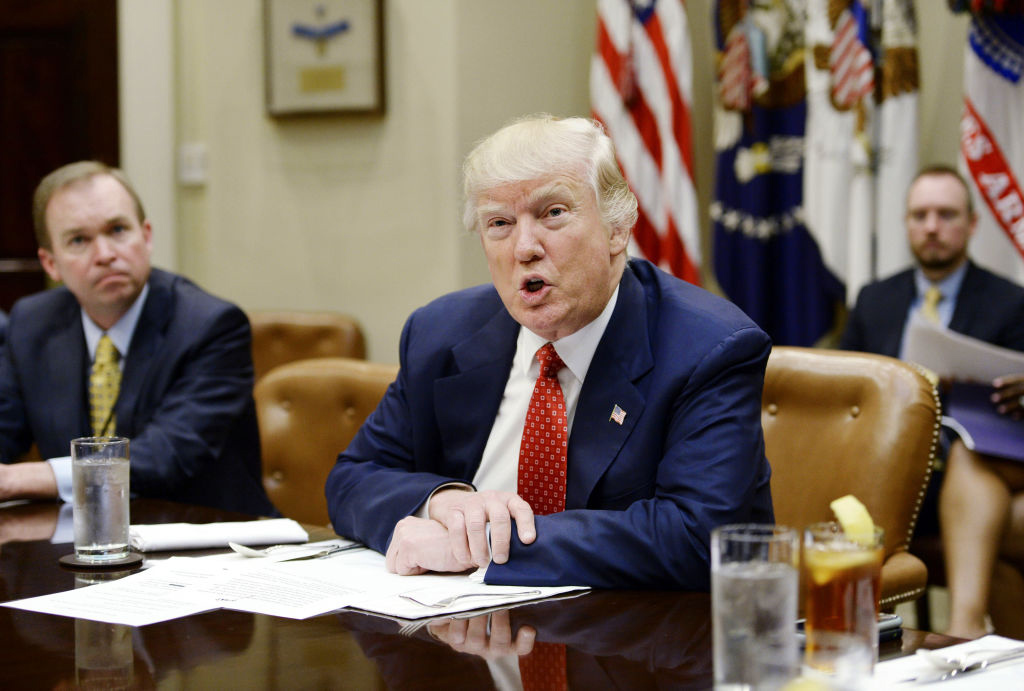Rather than adding to the deficit, the president’s proposal would pay for the programs America needs while cutting the ones it doesn’t.
President Trump’s “skinny budget” proposes a historic reform of the federal government’s discretionary-spending budget, providing much-needed relief from Washington’s stale approach of funding the same outdated, failed programs year after year.
It must be emphasized that the president did not release a comprehensive budget proposal covering the entire federal government. The new blueprint covers only the one-third of federal spending allocated to discretionary programs, which gets appropriated annually by Congress. This rapidly declining share of the federal budget is not driving runaway spending and deficits; Social Security, health-care entitlements, and interest on the national debt comprise 57 percent of current spending but will be responsible for 82 percent of all new spending over the next decade. The only way to avert the $1.4 trillion budget deficits that are projected within a decade is to address the entitlements that dominate the federal budget. So it is imperative that the president’s full budget proposal, scheduled for release later this spring, reform those vital but unsustainable programs.
That said, this budget proposal includes bold and innovative reforms to discretionary spending. Its centerpiece — a $54 billion (or 10 percent) increase in defense spending — reflects a growing bipartisan consensus that the 2011 Budget Control Act has cut national-security funding too much. Defense spending has fallen 22 percent (after inflation) since 2010, and is currently poised to sink below 2.9 percent of the gross domestic product (GDP) for the first since the 1930s.
We cannot run a 21st-century military on a Great Depression budget. President Obama’s former defense secretary, Leon Panetta — a defense-cutting budget hawk when he served in Congress — has called sequestration’s defense-spending caps “catastrophic,” “a disaster,” and a “a goofy meat-ax approach” that will “hollow out” the military. Obama himself recognized as much, proposing a defense-spending hike only 3 percent below Trump’s in his final budget.
We owe our troops fair compensation, adequate facilities, and sufficient technological advancements to keep them safe in the field. Even the budgetary bump proposed by Trump would merely push 2018 defense spending to 3.3 percent of GDP — one-third below the 50-year average.
President Trump deserves credit for seeking to fund an increase in defense spending with cuts elsewhere, rather than with more debt. Non-defense discretionary spending has already been constrained by years of small spending growth, so cutting it by $54 billion to offset more spending on the military will be difficult for many to swallow. But rather than simply continuing to nickel-and-dime each program, Trump’s budget wisely funds (and even expands) programs that work, while privatizing, devolving, and eliminating programs that are duplicative or ineffective. This more thoughtful approach will help Washington focus on performing a few vital functions well, rather than many functions poorly.
“President Trump deserves credit for seeking to fund an increase in defense spending with cuts elsewhere, rather than with more debt.”
High-priority programs and agencies would receive healthy funding increases under Trump’s proposal, which includes an additional $4.6 billion for veterans’ health, $250 million for the FBI, $2.6 billion for border security, $300 million to hire more Border Patrol agents and immigration-enforcement personnel, $1.4 billion for school-choice programs, and $500 million to fund initiatives fighting the opioid surge. At the same time, the President would eliminate the failed Community Development Block Grant (CDBG) program, which costs $7 billion and too often serves as a federal slush fund for wealthy local governments. He would privatize the National Endowment for the Arts (NEA), the National Endowment for the Humanities (NEH), and the Corporation for Public Broadcasting (CPB). He would end Washington’s practice of bailing out unprofitable Amtrak routes. And he would give states more responsibility for their own environmental and community-developmental policies.
Congress may be tempted to take a “cafeteria” approach to this budget request by eagerly accepting all the spending increases while rejecting the accompanying cuts. That would be a costly mistake, not just because it would bust the budget caps and exacerbate the deficit, but because Trump’s proposal represents a rare chance to reexamine Washington’s priorities. For too long, Congress has continued to fund the same outdated New Deal and Great Society programs while layering on hundreds of new programs that serve the same purpose, even as it fails to hold agencies that receive its largess accountable for poor performance. Congress should immediately begin holding hearings to evaluate the programs on the president’s chopping block, rather than letting interest-group politics obstruct his efforts to finally build a more limited and effective federal government.
This piece originally appeared at National Review Online
______________________
Brian M. Riedl is a senior fellow at the Manhattan Institute. Follow him on Twitter here.
This piece originally appeared in National Review Online
